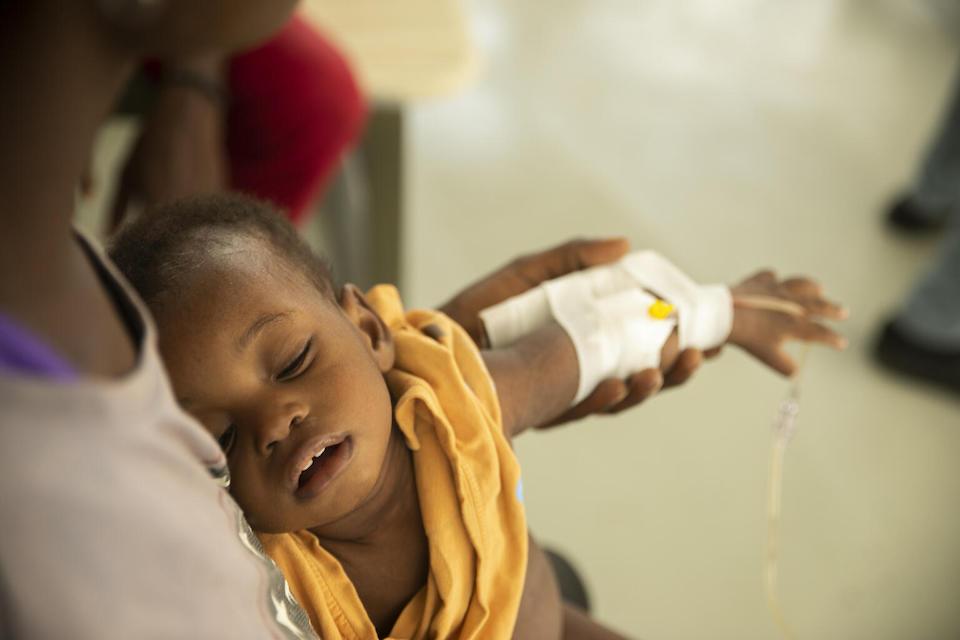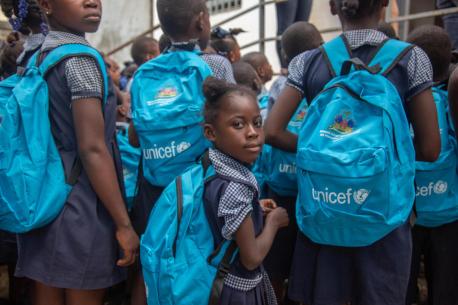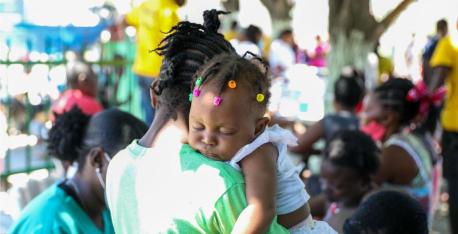
As Cholera Cases Surge Worldwide, UNICEF Helps Countries Fight Back
From Haiti to Syria to Pakistan, UNICEF is rushing supplies for treatment and prevention, but more support is needed.
Since January of this year, 29 countries have had outbreaks of cholera — the most at any one time on record, some of them places that have not seen a single case of the highly infectious waterborne disease for decades.
In Haiti, Lebanon, Syria and elsewhere, the outbreaks have been difficult to control. Fatality rates in Ethiopia, Malawi and Pakistan have been particularly high, at 3 percent — triple the average.
UNICEF warns that as many as 1.1 billion people in the world are at risk of contracting cholera due to climate change impacts — namely the more intense, more frequent cyclones and hurricanes that bring extreme rainfall and devastating floods.
Cholera is a bacterial infection spread through contaminated food and water — leading to acute watery diarrhea, which can lead to severe dehydration
UNICEF has been responding to the global cholera crisis by rushing supplies for treatment and ramping up prevention efforts with partners on the ground.
These activities include strengthening sanitation systems and hygiene practices at the household and community level, focusing on areas already experiencing an outbreak and those at high risk. UNICEF is also helping neighboring countries step up measures to prevent cross-border spread.

Challenges to these response efforts include changing patterns that are complicating efforts to predict and plan for outbreaks. Endemic countries are also seeing more cases during the "low season," times when there used to be little or no transmission. Supplies of rapid diagnostic kits, oral rehydration salts and other essential commodities are limited, and there are not enough oral cholera vaccines to go around.
UNICEF has partnered with the World Health Organization to closely monitor disease risk and global spread; identify countries for targeted and timely cholera preparedness and response; and ultimately break transmission pathways to significantly reduce serious cases and deaths.
Cholera risks are high in humanitarian settings
Cholera is both preventable and treatable. Regular handwashing and consistent access to safe water for drinking, cooking and personal hygiene keeps the disease at bay.
Outbreaks tend to occur in places where water and sanitation systems are weak or poorly managed, where poverty persists, and where families are displaced due to conflict and climate change.
When there is flooding, and safe water supplies are disrupted, risks multiply as families and their children turn to unsafe water sources — which is why containing and preventing cholera is a priority for emergency teams responding to needs in flood-impacted areas of Pakistan, Nigeria and the Democratic Republic of the Congo.
It is also a priority for UNICEF and partners on the ground in the Horn of Africa and Sahel region, where severe drought has caused widespread displacement and soaring rates of malnutrition in children.
In Haiti, cholera and malnutrition are a 'lethal combination'
Malnourished children who are exposed to cholera are more vulnerable to developing severe cholera disease, which can be fatal. Managing cholera cases and containing an outbreak is a huge burden for already overstretched health care systems.
The cholera fight in Haiti is particularly urgent, with children accounting for 2 out of every 5 cases.
“In Haiti right now, there is a triple threat to children’s lives – malnutrition, cholera and armed violence, and sometimes all three together," Manuel Fontaine, Director of the Office of Emergency Programs, said as he concluded a four-day visit to the country in mid-November.
Fontaine said he was "shocked" to see so many children at risk of dying in the cholera treatment centers, noting that it takes just a few hours for acute watery diarrhea and vomiting to dehydrate and weaken a child. Timely treatment is critical to their survival. "Cholera and malnutrition are a lethal combination, one leading to the other.”

Bertrand Bainvel, UNICEF Deputy Regional Director for the Middle East and North Africa, recently appealed for swift support to curb cholera outbreaks in Syria and Lebanon.
"The risks of the disease further spreading to other countries in the region call for immediate action," he said. In Syria alone, there were 20,000 suspected cases of acute watery diarrhea and 75 cholera-associated deaths as of Oct. 24.

UNICEF helps countries fight cholera by:
- procuring and distributing items such as acute watery diarrhea treatment kits to hospitals and health centers and water purification tablets to households
- provides strategic technical support and guidance to governments and other local partners in outbreak prevention, preparedness and response
- coordinates with WHO and other agencies on disease surveillance, service delivery and other activities
- supporting public awareness campaigns focused on prevention
- working with partners to advance long-term, climate-resilient solutions to water scarcity
Combatting cholera — and preventing child deaths from cholera — requires an integrated approach across multiple UNICEF programs, including health, water, sanitation and hygiene (WASH), nutrition, education, protection and other sectors as well as services for communication, emergency operations and supply management.
Help UNICEF and partners step up efforts to protect vulnerable children and families from cholera and other preventable diseases. Donate today.
HOW TO HELP
There are many ways to make a difference
War, famine, poverty, natural disasters — threats to the world's children keep coming. But UNICEF won't stop working to keep children healthy and safe.
UNICEF works in over 190 countries and territories — more places than any other children's organization. UNICEF has the world's largest humanitarian warehouse and, when disaster strikes, can get supplies almost anywhere within 72 hours. Constantly innovating, always advocating for a better world for children, UNICEF works to ensure that every child can grow up healthy, educated, protected and respected.
Would you like to help give all children the opportunity to reach their full potential? There are many ways to get involved.





